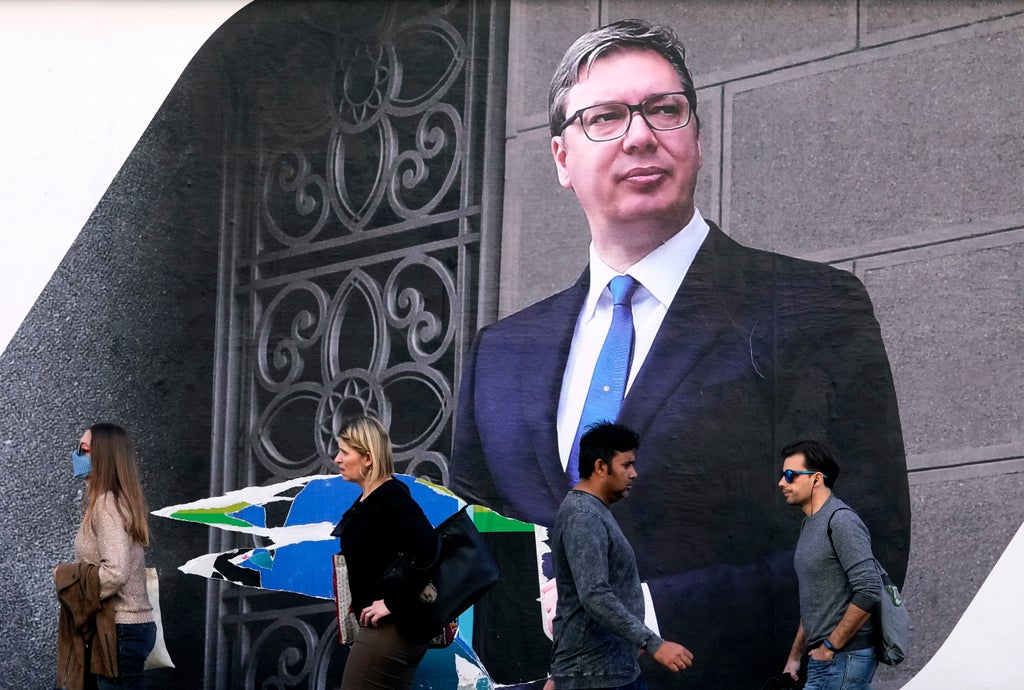
Serbian President Aleksandar Vucic, who has fostered close ties with Russia and refused to impose sanctions against Moscow for its invasion of Ukraine, is expected to extend his almost 10-year grip on power in the Balkan country when it holds national elections on Sunday.
Polls predict that Vucic, a populist who has boasted about his personal ties to Russian President Vladimir Putin, will win another five-year term as president. His right-wing Serbian Progressive Party also is expected to continue to dominate the country's parliament.
But polls indicated a close local government race in the capital, Belgrade. A loss for Vucic's party there could undermine his increasingly autocratic rule.
Most political parties taking part in the presidential, general and municipal elections lean right, reflecting the conservative stands prevalent among Serbia's 6.5 million voters. But a new Green-left coalition campaigning on the need to tackle long-neglected environmental problems also is fielding candidates.
Opposition party officials say Russia's war in Ukraine has only strengthened Vucic’s dominance of Serbian politics and the mainstream media. Soon after Russian tanks entered Ukraine, the president's election slogan changed to “Peace. Stability. Vucic.”
“The war has diverted public attention from what is happening in Serbia and of course, with media support, enabled Vucic to blame the crisis for everything that is wrong in Serbia,” Dragan Djilas, a leader of the biggest opposition coalition United Serbia, said in an interview.
“Articles are published here every day about how a kilogram of bread costs 9 euros in Italy and Germany, how they have no fuel, how they will have food stamps and how great we are,” Djilas said. “People are scared, and it always suits the authorities because people say, ‘Let’s not change anything now.’"
Serbia, a traditional Russian ally, has rejected calls from the European Union and the United States to join in sanctions against Moscow, citing national interests. The country's representative to the United Nations did vote in favor of a resolution condemning Moscow’s attack on Ukraine as a violation of international law.
Despite the Serbian government saying it is seeking EU membership, Vucic and his allies have refrained from condemning Russia over the invasion, a possible sign they want to avoid alienating pro-Russia voters ahead of Sunday’s election.
Much of the pro-Russia sentiments among Serbs comes from their hatred of NATO; the Western military alliance bombed the country in 1999 to stop a bloody Serb crackdown on ethnic Albanians seeking independence for Kosovo, a Serbian province at the time.
Former Serbian Foreign Minister Ivica Dacic said that imposing sanctions on Russia would be tantamount to “political suicide” because Moscow has blocked U.N. membership for Kosovo which declared independence in 2008.
“If we are ready to give up Kosovo, then we can impose sanctions on Russia,” Dacic said. “But if we are not ready, then we cannot.”
Thousands of people in Serbia have turned out for pro-Putin rallies during the five-week invasion, waving Russian flags and displaying the letter Z - a symbol seen on Russian military vehicles in Ukraine. The support for Moscow makes Serbia somewhat of an outlier in Europe.
Opposition officials said that despite Vucic’s almost full control of the media and the pro-Russian narrative that has been created leading up to the elections, they expect a good result on Sunday.
“As far as we are concerned, the situation in Ukraine was very clear. It is about Russian aggression, and we immediately condemned it,” Dobrica Veselinovic, who is running for mayor of Belgrade as the candidate of the environmentalist We Must coalition.
Election polls predict Vucic will win the presidential election outright on Sunday. If he does not receive more that 50% of the vote, he would face an unpredictable runoff in two weeks, likely against opposition candidate Zdravko Ponos, a Western-educated former army general.
The election for National Assembly lawmakers was not scheduled until 2024, but Vucic called an early vote after criticism from the EU that Serbia's 2020 election had not been free and fair. The opposition boycotted that election.
“I don't see any difference between these elections and those two years ago," political analyst Slobodan Stupar said. “A parliament will be formed in which Vucic will have fewer lawmakers than now. He will be able to tell Europe, ‘Yes, we are a democratic country. See how many enemies I have in parliament.'"







